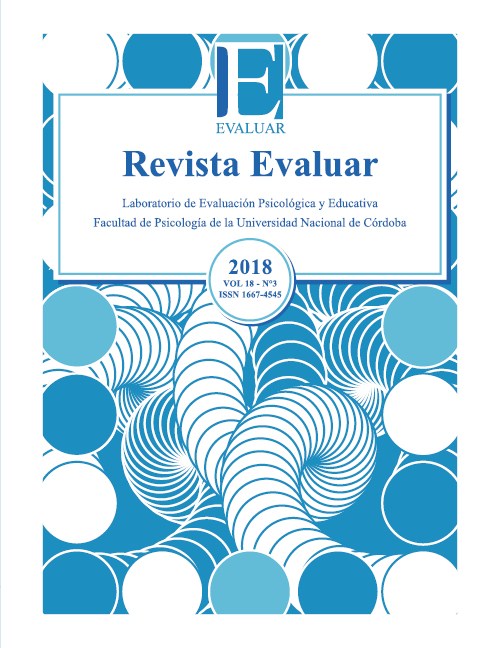Psychometric Properties of the Flourishing Scale in Puerto Rico
DOI:
https://doi.org/10.35670/1667-4545.v18.n3.22203Keywords:
bienestar, bienestar psicológico, florecimiento, propiedades psicométricas, validaciónAbstract
This article examines the psychometric properties of the Flourishing Scale in Puerto Rico. Three studies were carried out with this purpose. The first study, of 665 partic-ipants, analyzed the reliability and factorial structure of the scales. The second study, of 821 participants, carried out a confirmatory factorial analysis. The third study, of 342 Puerto Rican women, calculated the convergent and diver-gent validity of the scales with other measures of wellbeing and depression. The results of the studies showed adequate psychometric properties in the scale. The reliability index of the scale was of .95. The variance in the exploratory factorial analysis was 65.35%. The results confirmed that the scale has a one-dimensional structure. The eight items complied with the criteria of discrimination. Convergent and discriminant validity analyses were performed by eval-uating correlation between flourishing, satisfaction with life and depression, obtaining statistically significant values. These results suggest that the Flourishing Scale has the po-tential to measure this construct among Puerto Rican adults.
Downloads
References
Aristóteles (2001). Ética. Madrid, España: Libsa.
Byrne, B. M. (2010). Structural equation modeling with AMOS: Basic concepts, applications, and programming. New York, NY: Psychology Press.
Cassaretto-Bardales, M., & Martinez-Uribe, P. (2017). Validación de las escalas de bienestar, de florecimiento y afectividad. Pensamiento Psicológico, 15(1), 19-31.
Chitgian-Urzúa, V., Urzúa, A., & Vera-Villarroel, P. (2013). Análisis preliminar de las Escalas de Bienestar Psicológico en población chilena. Revista Argentina de Clínica Psicológica, 22(1), 5-14.
Csikszentmihalyi, M. (1990). Flow: The psychology of optimal experience. New York, NY: Harper & Row.
Diener, E. (2000). Subjective well-being: The science of happiness and proposal for a national index. American Psychologist, 55(1), 34-43. doi: 10.1037/0003-066X.55.1.34
Diener, E., & Suh, E. (2000). Culture and subjective well-being. Cambridge: Massachusetts Institute of Technology.
Diener, E., Emmons, R. A., Larsen, R. J., & Griffin, S. (1985). The Satisfaction with Life Scale. Journal of Personality Assessment, 49(1), 71-75. doi: 10.1207/s15327752jpa4901_13
Diener, E., Wirtz, D., Biswas-Diener, R., Tov, W., Kim-Prieto, C., Choi, D.-w., & Oishi, S. (2009). New measures of well-being. En E. Diener (Ed.), Social indicators research series: Vol. 39. Assessing well-being: The collected works of Ed Diener (pp. 247-266). New York, NY: Springer Science + Business Media. doi: 10.1007/978-90-481-2354-4_12
Diener, E., Wirtz, D., Tov, W., Kim-Prieto, C., Choi, D., Oishi, S., & Biswas-Diener, R. (2010). New well-being measures: Short scales to assess flourishing and positive and negative feelings. Social Indicators Research, 97(2), 143-156.
Esch, T., Jose, G., Gimpel, C., Von Scheidt, C., & Michalsen, A. (2013). Die Flourishing Scale (FS) von Diener et al. liegt jetzt in einer autorisierten deutschen Fassung (FS-D) vor: Einsatz bei einer Mind-Body-medizinischen Fragestellung. Forschende Komplementarmedizin, 20(4), 267-275. doi: 10.1159/000354414
Faulk, K. E., Gloria, C. T., & Steinhardt, M. A. (2013). Coping profiles characterize individual flourishing, languishing, and depression. Anxiety, Stress, & Coping: An International Journal, 26(4), 378-390. doi: 10.1080/10615806.2012.708736
González-Rivera, J. A., Pabellón-Lebrón, S., & Rosario-Rodríguez, A. (2017). El rol mediador de la identificación ateísta en la relación entre discriminación y bienestar psicológico: Un estudio preliminar. Revista Puertorriqueña de Psicología, 28(2), 406-421. Recuperado de http://www.ojs.repsasppr.net/index.php/reps/index
González-Rivera, J. A., Quintero-Giménez, N., Veray-Alicea, J., & Rosario-Rodríguez, A. (2016). Adaptación y validación de la escala de bienestar psicológico de Ryff en una muestra de adultos puertorriqueños. Salud y Conducta Humana, 3(1), 1-14. Recuperado de http://rsych.com/
Helliwell, J. F., Barrington-Leigh, C., Harris, A., & Huang, H. (2010). International evidence on the social context of well-being. En E. Diener, D. Kahneman, & J. F. Helliwell (Eds.), International differences in well-being, (pp. 291-327). Oxford, UK: Oxford University Press. doi: 10.1093/acprof:oso/9780199732739.003.0010
Hone, L., Jarden, A., & Schofield, G. (2014). Psychometric properties of the Flourishing Scale in a New Zealand sample. Social Indicators Research, 119(2), 1031-1045. doi: 10.1007/s11205-013-0501-x
Howell, A. J., & Buro, K. (2015). Measuring and predicting student well-being: Further evidence in support of the Flourishing Scale and the Scale of Positive and Negative Experiences. Social Indicators Research, 121(3), 903-915. doi: 10.1007/s11205-014-0663-1
IBM Corporation (2016). IBM SPSS Statistics for Windows, Version 24.0 [Software de computación]. Armonk, NY: IBM.
Keyes, C. L. M. (2002). The mental health continuum: From languishing to flourishing in life. Journal of Health and Social Behavior, 43(2), 207-222. doi: 10.2307/3090197
Keyes, C. L. M. (2006). Mental health in adolescence: Is America’s youth flourishing? American Journal of Orthopsychiatry, 76(3), 395-402. doi: 10.1037/0002-9432.76.3.395
Keyes, C. L. M., Shmotkin, D., & Ryff, C. D. (2002). Optimizing well-being: The empirical encounter of two traditions. Journal of Personality and Social Psychology, 82(6), 1007-1022. doi: 10.1037/0022-3514.82.6.1007
Kline, P. (2000). The Handbook of Psychometric Testing. New York: Routledge.
Kline, T. J. B. (2005). Psychological testing: A practical approach to design and evaluation. Thousand Oaks: Sage. doi: 10.4135/9781483385693
Lovibond, S. H., & Lovibond, P. F. (1995). Manual for the Depression Anxiety Stress Scales (2a Ed.). Sydney: Psychology Foundation.
Montero, I., & León, O. G. (2007). A guide for naming research studies in psychology. International Journal of Clinical and Health Psychology, 7(3), 847-862. Recuperado de http://www.aepc.es/ijchp/busca.php?-coid=Espa%F1ol
Raykov, T., & Shrout, P. E. (2002). Reliability of scales with general structure: Point and interval estimation using a structural equation modeling approach. Structural equation modeling: A Multidisciplinary Journal, 9(2), 195-212. doi: 10.1207/S15328007SEM0902_3
Rosenberg, M. (1965). Society and the adolescent self-image. Princeton, NJ: Princeton University Press. doi: 10.1515/9781400876136
Ryan, R., & Deci, E. (2001). On happiness and human potentials: A review of research on hedonic and eudaimonic well-being. Annual Review of Psychology, 52(1), 141-166. doi: 10.1146/annurev.psych.52.1.141
Ryff, C. (1989). Happiness is everything, or is it? Exploration on the meaning of psychological well-being. Journal of Personality and Social Psychology, 57(6), 1069-1081. doi: 10.1037/0022-3514.57.6.1069
Ryff, C. (1995). Psychological well-being in adult life. Current Directions in Psychological Science, 4(4), 99-104. doi: 10.1111/1467-8721.ep10772395
Satorra, A., & Bentler, P. M. (2001). A scaled difference chi-square test statistic for moment structure analysis. sychometrika, 66(4), 507-514. doi: 10.1007/BF02296192
Schumacker, R. E., & Lomax, R. G. (2010). A beginner’s guide to structural equation modeling (3a ed.). Mahwah, NJ: Erlbaum. doi: 10.4324/9780203851319
Seligman, M. E. (2002). Authentic happiness: Using the new positive psychology to realize your potential for lasting fulfillment. New York, NY: Free Press.
Seligman, M. E., & Csikszentmihalyi, M. (2000). Positive psychology: An introduction. American Psychologist, 55(1), 5-14. doi: 10.1037/0003-066X.55.1.5
Seligman, M. E., & Peterson, C. (2003). Positive clinical psychology. En L. G. Aspinwall & U.M. Staudinger (Eds.). A Psychology of human strengths: Fundamental questions and future directions for a positive psychology (pp. 305-317). Washington, DC: American Psychological Association.
Silva, A. J., & Caetano, A. (2013). Validation of the Flourishing Scale and Scale of Positive and Negative Experience in Portugal. Social Indicators Research, 110(2), 469-478. doi: 10.1007/s11205-011-9938-y
StataCorp. (2017). Stata: Release 15 [Software de Computación]. College Station, TX: StataCorp LLC.
Stevens, J. (2002). Applied multivariate statistics for the social sciences (4a ed.). Mahwah, NJ: Lawrence Erlbaum Associates.
Sumi, K. (2013). Reliability and validity of Japanese versions of the Flourishing Scale and the Scale of Positive and Negative Experience. Social Indicators Research, 118(2), 601-615. doi: 10.1007/s11205-013-0432-6
Waterman, A. S., Schwartz, S. J., Zamboanga, B. L., Ravert, R. D., Williams, M. K., Agocha, V. B., ... Donnellan, M. B. (2010). The Questionnaire for Eudaimonic Well-Being: Psychometric properties, demographic comparisons, and evidence of validity. The Journal of Positive Psychology, 5(1), 41-61. doi: 10.1080/17439760903435208
Watson, D., Clark, L. A., & Tellegen, A. (1988). Development and validation of brief measures of positive and negative affect: The PANAS scales. Journal of Personality and Social Psychology, 54(6), 1063-1070. doi: 10.1037/0022-3514.54.6.1063
Downloads
Published
How to Cite
Issue
Section
License
Copyright (c) 2018 Juan Aníbal González-Rivera

This work is licensed under a Creative Commons Attribution 4.0 International License.
Revista Evaluar aplica la Licencia Internacional de Atribuciones Comunes Creativas (Creative Commons Attribution License, CCAL). Bajo esta licencia, los autores retienen la propiedad de copyright de los artículos pero permiten que, sin que medie permiso de autor o editor, cualquier persona descargue y distribuya los artículos publicados en Evaluar. La única condición es que siempre y en todos los casos se cite a los autores y a la fuente original de publicación (i.e. Evaluar). El envío de artículos a Evaluar y la lectura de los mismos es totalmente gratuito.




_(3).jpg)



.jpg)



